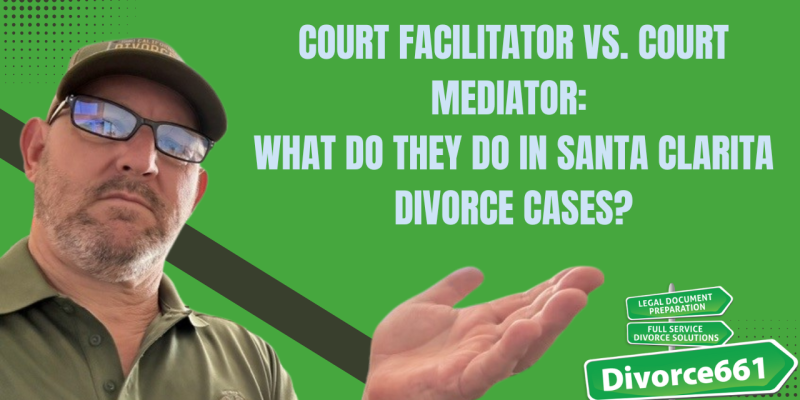Court Facilitator vs. Court Mediator: What Do They Do in Santa Clarita Divorce Cases?
When navigating the complexities of divorce, especially in Santa Clarita and the greater Los Angeles area, understanding the roles of court professionals can make a significant difference. I’m Tim Blankenship, owner of Divorce661, and I want to clarify the distinct functions of two key court-appointed neutral parties: the court mediator and the court facilitator. Both play crucial roles in helping divorcing couples reach agreements, but they focus on different issues and offer unique assistance during the divorce process.
Understanding the Role of a Court Mediator
A court mediator is an attorney employed by the courts as a neutral third party. Their primary role is to assist couples in reaching agreements on matters related to children, specifically:
- Child support
- Child custody
- Child visitation
This process is often referred to as parenting plan mediation. If you file a motion concerning child support, custody, or visitation—or any request for order regarding these issues—you will usually be required to engage in mediation. However, you can also schedule an appointment with the mediator at any time if you need help developing a parenting plan that works for everyone involved.
The mediator’s job is not to impose decisions or force agreements but to educate both parties and facilitate a mutually agreeable solution regarding the upbringing and care of your children.
The Role of the Court Facilitator
In contrast, the court facilitator is another court-employed attorney who serves as a neutral party, but their focus is exclusively on spousal support. If you have questions about spousal support—such as how much you might have to pay or receive, or what the legal guidelines say—the facilitator is the person to consult.
The facilitator’s job is to help you understand the laws around spousal support and assist in arriving at a fair figure for support payments. Like mediation, this service is designed to help you come to an agreement without the need for contentious court battles.
Key Differences Between the Mediator and Facilitator
- Mediator: Focuses on child-related issues—support, custody, visitation, and parenting plans.
- Facilitator: Specializes in spousal support matters only.
- Both are neutral parties employed by the court and do not represent either spouse.
- Neither service is mandatory; they do not force agreements but help educate and guide parties toward resolution.
How These Services Help You Through Divorce
Divorce can be overwhelming, especially when it comes to negotiating child custody or financial support. These court services exist to reduce conflict and streamline the process by offering professional, neutral assistance. Whether you need help putting together a detailed parenting plan or figuring out spousal support, the mediator and facilitator provide valuable support to help you move forward.
If you find yourself needing guidance or assistance in navigating the divorce process, especially in matters related to child custody, visitation, child support, or spousal support, reaching out to these court resources can be a smart first step.
Need Help? Contact Divorce661
If you have questions about working with the court mediator or facilitator, or if you need expert help to get through your divorce, that’s exactly what we specialize in at Divorce661. You can reach me directly at 661-281-0266 or visit our website at www.divorce661.com for more information and personalized assistance.
Understanding the difference between the court mediator and court facilitator can empower you to take control of your divorce process and work towards agreements that protect your interests and those of your children.

